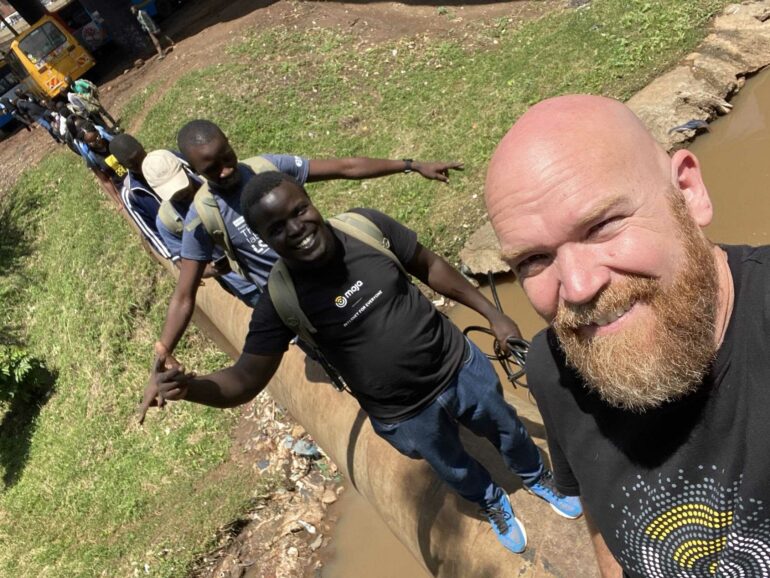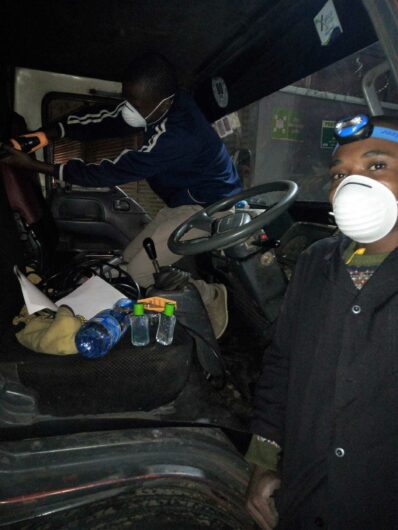Working in the Field During Coronavirus
BRCK’s field team plays an essential role in keeping Moja WiFi up and running and our customers happy and online. On most days, we’re spread out across different cities and towns, providing maintenance to our equipment in matatus and at fixed sites. We are continuously problem solving as unexpected challenges arise. We are used to workdays full of variety, personal interactions, and enjoy the buzz and energy in the field. It keeps us fit, energetic, and cheerful. But working in the field during Coronavirus means that things have looked a little different lately.

The field team prior to the restrictions.
COVID-19 in Kenya
Kenya announced its first case of COVID-19 on 12th March, several months after the beginning of the outbreak in China. We had to first internalise the whole situation and strategize a way forward for field operations. Being on the frontlines, where our daily routines involve interacting with people, there were quite a few things to consider.
Before the pandemic, our operations included daily visits to fixed and mobile spots, with one-on-one interactions with drivers, agents, and users. Field techs would move freely in town, fixing and maintaining WiFi devices. At lunch hour, we would meet up at our favourite joint while planning out the rest of the day. This free movement gave us the flexibility to repair equipment and address issues as they arose. Overnight, this had to change immediately to prevent the possible spread of the virus.
Safety Measures
At this point, in line with government regulations, field operations are continuing – but with some significant changes. To flatten the curve, we are taking the following measures:
- Practising social distancing. To avoid the use of public transport, one person picks each tech from their homes and also practises caution while in the vehicle. When off duty, we stay at home. We avoid crowded areas and only operate in designated areas with minimal interference where we can observe social distancing. On the mobile network, we no longer move to bus stops and stages. Instead, we contact the individual drivers and meet at identified parking areas that are not crowded.
- Cleaning frequently touched surfaces and objects. We use disinfectants to clean hand tools and equipment used on site. Prior to touching any agent-owned or site infrastructure, we spray or wipe down using a disinfectant. Regularly washing our overalls and dust coats, we make sure our work vehicles are kept clean and well ventilated. We regularly clean the commonly touched surfaces with a disinfectant.
- Practising hand hygiene by thoroughly washing hands using soap and water and/or using a hand sanitizer regularly, especially after maintenance at a site or a matatu.
- Wearing protective gear such as gloves, face masks, and safety glasses.
- Using good judgement. This includes avoiding the sharing of phones or other work tools and equipment, reminding others on the precautions to flatten the curve, and observing the government curfew.
Impacts of the Pandemic
With the outbreak of the pandemic came unexpected challenges. With reduced numbers of commuters in and out of town, some matatus have been parked, making accessing for maintenance difficult. The government has also placed restrictions limiting our movements, particularly for night maintenance.
On the fixed network, we have to factor in the 7 pm curfew when we plan assignments and travel routines. Planning tech visits also needs more coordination with agents, as some of their operating hours are now irregular and unpredictable. Additionally, since the government has imposed a 50% limit to passengers in private vehicles, the field guys have to work in shifts because our vehicles cannot carry the maximum number of people required for the job in a day.
Some Silver Lining
With the pandemic also came some positive trends. On the maintenance front, field engineers find it easier to maintain equipment, as clients and drivers are more cooperative. The WiFi fights boredom during this time of social distancing and there is less interference by people during servicing. Users have continued to interact with the network, even though the mobile network activity has reduced due to less travel. Video conferencing has also brought a new experience to the field team, as technicians from Kigali, Mombasa, and Kisumu are now able to participate in our weekly company-wide team meetings.
Looking Ahead
The coming weeks and months will continue to bring new situations. We will need to think creatively and adapt to changing circumstances. With the majority of our work out in public spaces, our highest priority is ensuring we continue to work safely. As people spend more time indoors, we believe the requirements and demands on the fixed network will grow, so we must do what we can now to fill the gaps and tap into new opportunities. The COVID-19 situation requires us to provide a reliable and consistent service, pay attention to our customers’ needs, and use our network to address some crucial gaps in the neediest communities. In these times of unpredictability and fear of the unknown, especially for those with fewer resources at hand, Moja plays a massive role to reduce the barriers to connectivity and affordability and making an impact to peoples lives.
As we continue working in the field during Coronavirus, our hope is that a vaccine is found very soon and the economic situation returns to normal. Until then, we will do our part to stop the spread of the virus while we continue expanding our network.
